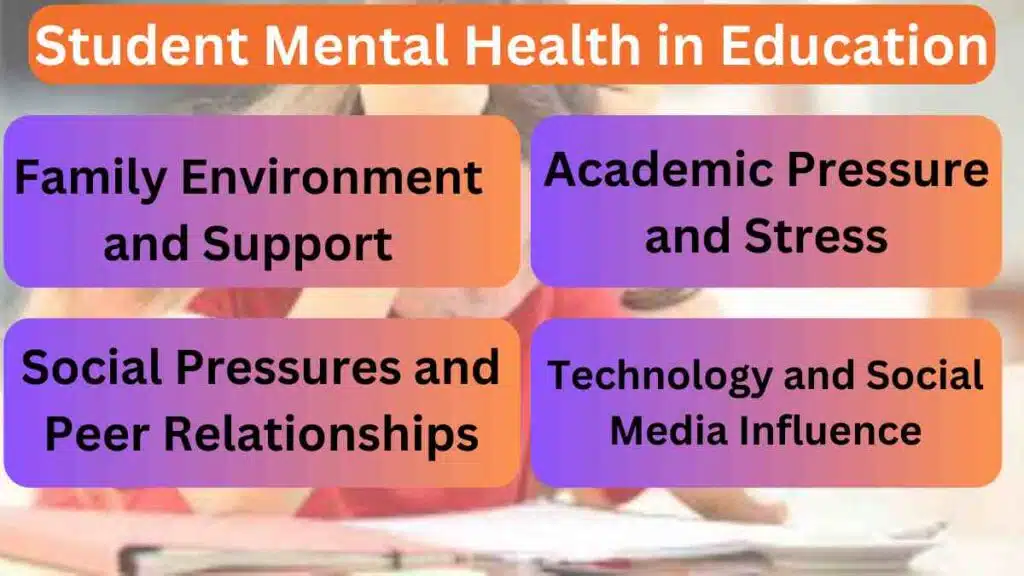Student Mental Health in Education
Student mental health in education is essential for nurturing well-rounded individuals who can grow academically and personally. Educational institutions can play a vital role in the mental well-being of their students. They can do this by creating supportive environments, implementing mental health programs, and promoting open communication.
The Importance of Mental Health in Education
Mental health plays a vital role in shaping a student’s ability to learn, interact with other students, and cope with challenges effectively. When students are emotionally balanced they are more engaged in their studies and extracurricular activities. Conversely, untreated mental health issues can hinder their academic progress and hinder their personal growth.
Common Mental Health Issues Among Students
Students face a myriad of mental health challenges, including anxiety, depression, stress, and social isolation. Academic pressures, social expectations, and familial dynamics can contribute to the onset of these issues. Identifying and addressing these problems early on is crucial for providing appropriate support and intervention.
Factors Impacting Student Mental Health in Education

Academic Pressure and Stress
The pursuit of academic excellence can often lead to overwhelming pressure and stress for students. The desire to perform well in exams, meet expectations, and secure a promising future can take a toll on their mental well-being.
Social Pressures and Peer Relationships
Social interactions and peer relationships significantly impact a student’s mental health. The need to fit in, maintain friendships, and handle conflicts can be emotionally challenging, especially during adolescence.
Family Environment and Support
The family environment plays a crucial role in shaping a student’s mental health. Supportive and nurturing families can positively influence a student’s emotional resilience and coping abilities.
Technology and Social Media Influence
The pervasive presence of technology and social media can have both positive and negative effects on student mental health. While it provides avenues for connection and information, excessive screen time and cyberbullying can lead to adverse outcomes.
Identifying Mental Health Problems in Students
Signs and Symptoms
Educators and parents must be vigilant about identifying signs of mental health issues in students. These signs may include changes in behavior, academic performance, mood swings, and withdrawal from social activities.
The Role of Teachers and Educators
Teachers and educators play a crucial role in identifying students who may be struggling with their mental health. Building trusting relationships with students and creating a supportive classroom environment can encourage students to seek help when needed.
Promoting Mental Health in Educational Institutions
Creating Supportive and Inclusive Environments
Educational institutions must strive to create an inclusive environment that supports students’ mental well-being. This involves fostering a sense of belonging, acceptance, and respect for diversity.
Implementing Mental Health Programs and Services
Schools can integrate mental health programs and services into their curriculum to raise awareness and provide the necessary support. These programs can include stress management workshops, counseling services, and peer support groups.
Encouraging Open Communication
Promoting open communication about mental health reduces the stigma surrounding it. Students should feel comfortable discussing their feelings and emotions with teachers, counselors, and peers without fear of judgment.
Addressing Stigma Surrounding Mental Health
Breaking down the stigma associated with mental health is vital for encouraging help-seeking behaviors. Educational institutions can organize campaigns and activities to foster understanding and empathy toward mental health challenges.
Coping Strategies for Students
Stress Management Techniques
Teaching students stress management techniques empowers them to handle academic and personal pressures more effectively. Techniques such as mindfulness, meditation, and time management can significantly reduce stress levels.
Building Resilience and Self-esteem
Resilience and self-esteem are essential attributes that contribute to a student’s mental well-being. Encouraging students to build resilience helps them bounce back from setbacks and challenges.
Seeking Professional Help
It is crucial for students to know that seeking professional help is not a sign of weakness. Encouraging students to talk to school counselors or mental health professionals can facilitate early intervention and support.
Supporting Students with Mental Health Challenges
The Role of School Counselors and Psychologists
School counselors and psychologists play a vital role in providing mental health support within educational settings. They can offer counseling, assessment, and referral services to students in need.
Involvement of Parents and Guardians
Collaboration between parents, guardians, and educational institutions is crucial in addressing student mental health challenges. Regular communication and joint efforts ensure a holistic approach to support.
Collaboration with Mental Health Professionals
Educational institutions can collaborate with external mental health professionals to provide specialized support to students with severe or ongoing mental health needs.
The Impact of COVID-19 on Student Mental Health
Challenges Faced During the Pandemic
The COVID-19 pandemic presented unprecedented challenges for students, including remote learning, social isolation, and uncertainty about the future. These challenges significantly impacted student mental health.
Strategies to Address Pandemic-Related Stress
Educational institutions must implement strategies to address pandemic-related stress and support students’ emotional well-being. This can include providing resources for coping with uncertainty and promoting a sense of community despite physical distancing.



Leave a Reply